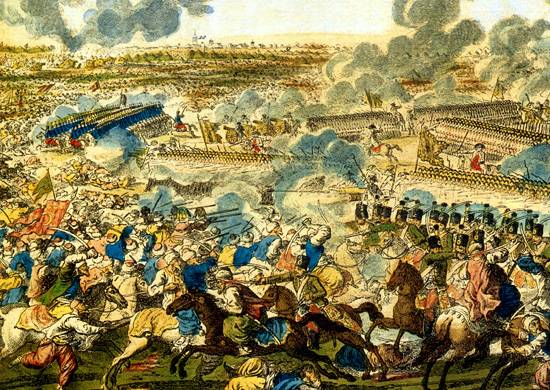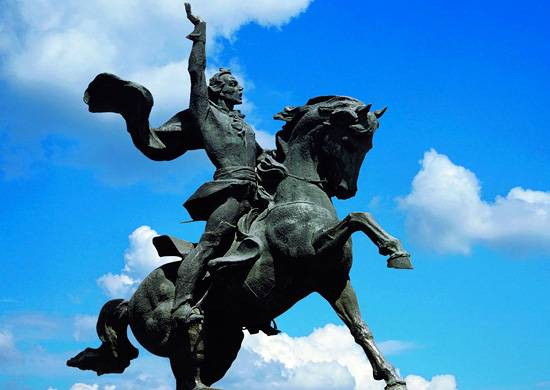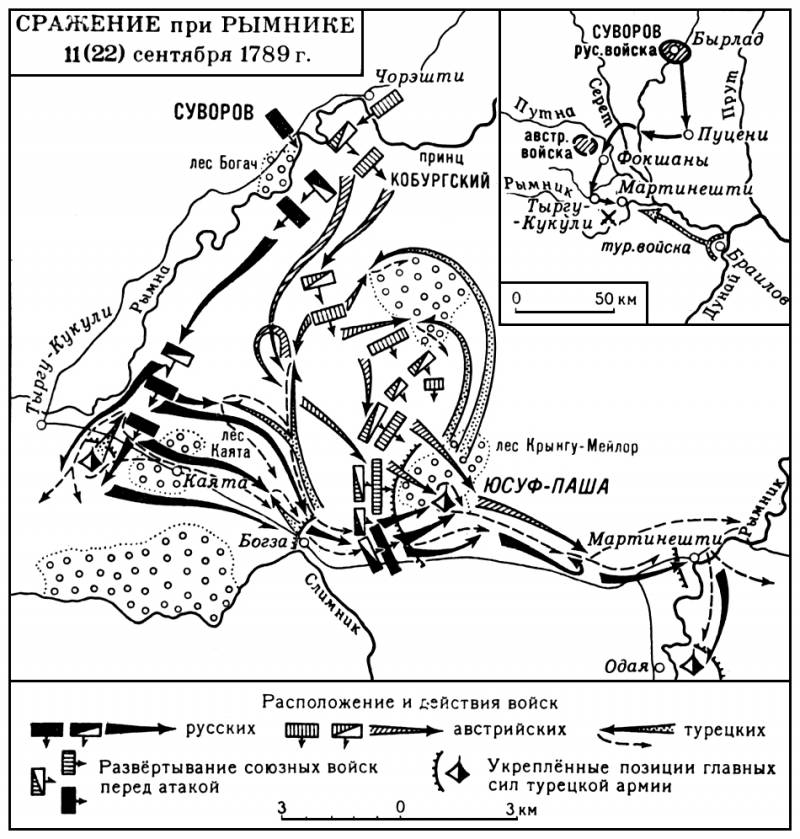"Only forward! Not one step back." 230 years ago Suvorov destroyed the Turkish army on the river Rymnik

The victory of the Russian troops at Rymnik. Colorized engraving by H. Schutz. The end of the XVIII century.
The situation on the Danube Front
In the spring of 1789, the Turks launched an offensive with three detachments - Kara-Megmet, Yakub-agi and Ibrahim. The Russian division under the command of Derfelden defeated the enemy in three battles at Barlad, Maximin and Galati (Division Derfelden thrice crushed the Turkish army) In the summer of 1789, the Turks again tried to go on the offensive and defeat individually the weak Austrian corps of the Prince of Coburg, and then the Russians in Moldova. Suvorov managed to come to the aid of the allies and on July 21 (August 1) defeated the Turkish corps in the battle of Fokshany (The Battle of Focsani) Turkish troops retreated to the fortress on the Danube. Alexander Vasilievich suggested the command to use success and go on the offensive, until the Turks came to their senses and again moved forward. However, they did not listen to him.
In August 1789, the Russian army under the command of Potemkin besieged Bender. The Russian commander, as during the siege of Ochakov in the 1788 year, acted extremely passively. Having advanced with his division to Southern Bessarabia, Prince Nikolai Repnin defeated the Turkish troops at the Salchi River on 7 on September 1789. Caring for the further strengthening of his army, Potemkin pulled almost all Russian troops under Bendery, leaving in Moldova only the numerically weak Suvorov’s division.
The Turkish commander-in-chief Vizier Yusuf Pasha decided to use the favorable moment, the remote location of the troops of Prince Koburgsky and Suvorov, to defeat them separately, and then go to the rescue of Bender. At first they planned to defeat the Austrian corps at Fokshan, then the Suvorov division at Barlad. Having gathered 100 thousand army, the Turks crossed the Danube at Brailov and moved to the river Rymnik. Here they are located in several fortified camps located a few kilometers from each other. The Austrians again asked for help from Alexander Suvorov. Immediately, the Russian commander began the march and on September 10 (21) allied with the Allies. He walked with his soldiers for two and a half days through impassable mud (heavy rain washed out the roads) 85 versts, crossed the river. Seret. The allies had 25 thousand soldiers (7 thousand Russians and 15 thousand Austrians) with 73 guns. Osmanov - 100 thousand people with 85 guns.
Defeat of the Turkish army
The Austrians doubted that it was necessary to attack the enemy. Too strong were unequal. In addition, the enemy held fortified positions. Turkish troops are located between the rivers Rymna and Rymnik. The first Ottoman camp was located on the banks of Rymna, near the village of Tirgu-Kukuli, behind it at the village of Bogza - the second, near the forest of Kryngu-Maylor and Rymnik - the third. Only in the first camp were the Ottomans twice as many as the Russians. The Austrian commander proposed to act on defense. However, Suvorov said that then he attacks only with his own forces. Prince of Coburg surrendered. The Russian commander first decided to attack the camp at Tirgu-Kukuli on his own, while the Austrians would guard the flank and rear, then join and hit the vizier. The calculation was on the suddenness and swiftness of action. Until the enemy came to his senses and used the small number of allies, dismembered them, circumvented the flanks and rear.
The Russian commander did not hesitate and spoke. By a hidden night march, the Allies left Fokshan, crossed the Rymna River and reached the Ottoman army camp. The Turkish command, confident in the victory over the weak corps of the Austrians (they still did not know about the arrival of the Russians), was taken by surprise. The Turks, despite the presence of numerous cavalry, were unable to organize effective reconnaissance. The Allied forces put up two infantry lines, followed by cavalry. The Russian-Austrian army formed a corner, apex to the enemy. The Russians, who became regimental square, made up the right side of the corner, the Austrians - the left. The Russian division played the role of the main striking force, the Austrian corps had to provide the flank and rear, while Suvorov defeated the enemy. During the movement between the Russian and Austrian forces, a gap of more than two versts formed, it was covered only by a small Austrian detachment under the command of General Karachai (2 thousand people).
The battle began at 8 hours 11 (22) September 1789 year. Russian troops reached the first Turkish camp. The Turks opened fire. There was a ravine on the soldiers' path, only one road led through it. Most of the troops had to wait in line. The first line has stopped. Suvorov threw the grenadier of the Fanagoria Regiment through the ravine. They hit with bayonets. Behind them crossed the ravine and the Absheron regiment. The attack was swift, panic began in the Turkish camp, the Russians seized the battery. The Turkish cavalry, who stood in the Kayat forest area, counterattacked, and the Turkish infantry supported it. The Ottomans tried to hit the flank of the Russian soldiers crossing the ravine. The enemy crushed the Russian Carabinieri and fell upon the Absheron men, they met the enemy with gun and cannon fire and bayonets. About half an hour, the Ottomans tried to break open a square. At this time, the Carabinieri recovered and switched to a new attack. In addition, the Turks fell under the fire of the Smolensk Regiment, which also forced a ravine. The enemy faltered ran. The first camp was captured.
Vizier Yusuf Pasha gathered all his numerous cavalry (about 45 thousand people) and sent 7 thousand troops to the left flank of the Russians, taking advantage of the fact that the second Russian line had not yet overcome the ravine. He also sent 18 thousand horsemen between Russian and Austrian troops to a weak detachment of Karachai and 20 thousand people to bypass the left flank of the Austrians. For several hours the battle was in full swing. Turkish cavalry, wave after wave, tried to smash and overturn the Allies square. The regiments of Suvorov stood unshakable, and the Austrians also stood. Karachai was in a particularly difficult situation, but with the support of the Russians, he resisted. The huge masses of Turkish cavalry crashed on the correct orders of the allied forces and were reflected by fire. The entire cavalry of the Ottoman army was scattered. The vizier made a mistake, did not abandon the main forces of his cavalry against the Austrians or Russians, but disconnected them.
Suvorov again led the troops on the offensive:
The Russians attacked Turkish positions near the village of Bogza. Turkish artillery fired, but it was ineffective and did little harm. Russian guns fired accurately, breaking the enemy’s resistance. Turkish cavalry attacked again, but also without success. Turkish sipahs were repulsed everywhere. As a result, here the resistance of the Ottomans was broken, the grenadiers and musketeers broke into the village. The Turks fled to the Kryngumeylorsky forest, where their main camp was located.
At 3 o'clock in the afternoon the allies went to the main Turkish camp, here they went on the attack from one front. Even before 40, the vizier had thousands of fresh troops, Russian-Austrian troops fought in the morning, were tired, there were no reserves. The Ottomans built fortifications near the Kryngumeylorsky forest, which occupied 15 thousand of selected troops - the Janissary, with artillery. The cavalry covered the flanks. It was necessary to surprise the enemy with something. In the morning, the Ottomans were struck by the sudden attack of the Russians, whom they did not expect to see here. Suvorov, seeing that the field fortifications were built carelessly, threw into the attack the entire allied cavalry - 6 thousand sabers. The Turks were stunned by such an absolutely amazing cavalry attack on the trenches. The first to break through the fortifications was the Starodubovsky Carabinier Regiment. A bloody hand-to-hand fight began. Russian cavalry arrived in time for the cavalry and struck at bayonets. The Janissaries were killed, and at 4 o'clock in the afternoon the victory was complete. The Turkish army turned into a running mass. Many warriors drowned in the stormy waters of the spilled Ramnik.
Thus, the Russian commander showed a brilliant example of the complex maneuvering of troops in rugged terrain. The Allies, made secretive concentration, dealt a quick blow to a much numerically superior army and defeated it in parts.
Missed opportunity to end the war
The Turks lost only those killed around 15 - 20 thousand people, several hundred prisoners. Four enemy camps with all the reserves of the Ottoman army became the trophies of the allies, all Turkish artillery - 85 guns and 100 banners. The total loss of the allies amounted to 650 people. For this battle, Alexander Suvorov received the title of Count Rymniksky and was awarded the Order of St. George 1-th degree. Joseph of Austria awarded the commander the title of Reichsgraf of the Roman Empire.
The victory was so grand that nothing prevented the Allies from crossing the Danube and ending the war. In fact, the Turkish army was no longer there. Only about 15 thousand Turkish soldiers came to Machin. The rest fled. However, the Russian commander in chief Potemkin, envious of the victory of Suvorov, did not use the opportunity and stayed with Bender. He only ordered Gudovich to take Hadzhibey and Ackerman, which the Russian troops did. Bender surrendered in November, and the 1789 campaign of the year ended. If there was a more determined and energetic commander in place of Potemkin, the war could have ended this year.
The Austrian army was also inactive, only in September the Allies crossed the Danube and took Belgrade. Koburgsky’s corps occupied Wallachia and was located near Bucharest. In the meantime, Istanbul entered into an alliance with Prussia, which put up an army on the borders of Austria and Russia. Encouraged by England and Prussia, the Ottomans decided to continue the war. Over the year, the Turks recovered from the Rymnik defeat, gathered strength and again concentrated them on the Danube.

Monument to A.V. Suvorov in Tiraspol. Sculptors - brothers Vladimir and Valentin Artamonov, architects - Ya. G. Druzhinin and Yu. G. Chistyakov. Opened in 1979 year

Information